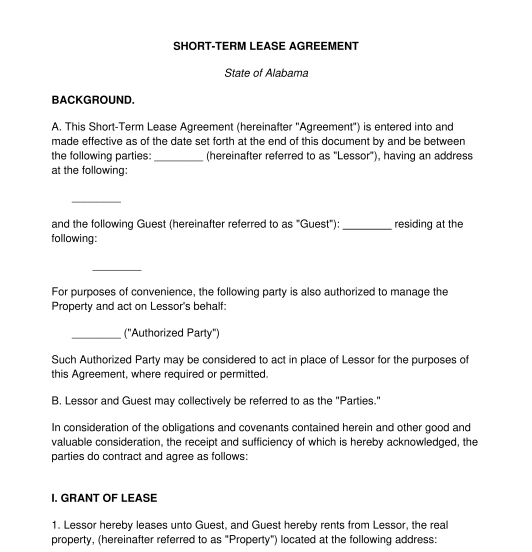 11/18/2025
11/18/2025

Answer a few questions and your document is created automatically.

Your document is ready! You will receive it in Word and PDF formats. You will be able to modify it.




Rating: 4.8 - 425 votes
Download a basic template (FREE) Create a customized documentA short-term lease agreement is a document that is used by a guest who would like to rent out a physical space from someone, known as the lessor, for only a short period of time. Short-term lease agreements can be very short, like a week or less, or up to a few months. It depends on what is appropriate for the guest's needs. A short-term lease is often used by a guest who is renting a property for a vacation stay or business trip where they will only be in town for a brief period of time.
Though both documents are used to rent out a property, they have different durations and use cases. A short-term lease is only to be used for a short stay, usually no longer than several months. A residential lease agreement is used for a more standard lease, like someone renting an apartment in which they live full-time for a longer period.
No, it is not mandatory to have a short-term lease. A guest could informally stay at a lessor's property without a formal written lease. However, using a short-term lease is highly advisable to protect both the guest and the lessor in this situation. It ensures that both parties understand their rights and responsibilities during the guest's stay and helps avoid misunderstandings and disputes. Paradoxically, the shorter the stay, the more important the small details become. This makes a short-term lease a very advisable option for both guest and lessor.
A security deposit is money paid from the guest to the lessor at the start of the lease. This money is meant to be used by the lessor to cover any damages that happen to the property through the fault of the guest. At the end of the lease, if there is no damage, the security deposit is returned to the guest.
The two parties who enter into a short-term lease agreement are the person who is renting out the property, known as the lessee, and the person whose property is being rented, known as the lessor.
Both individuals and businesses may enter into short-term lease agreements. For individuals entering into lease agreements, they must be of legal age to enter into a contract, 18 years of age or older in most states. They must also be mentally competent to enter into a contract. Business entities entering into a lease agreements must have the legal authority to do so, usually outlined in the business' governing documents, such as bylaws or operating agreement.
A short-term lease is usually for no longer than several months, as longer leasing arrangements would use a standard residential lease agreement.
When the short-term lease is written and all the relevant information has been included, both the lessor and the guest should sign and date the document. The parties should each keep a copy of the agreement for reference and in case of future dispute. The signing does not need to be witnessed, and the document does not need to be notarized for it to go into effect.
A valid short-term lease agreement must contain at least the following mandatory clauses:
Lease agreements in the United States are generally subject to the laws of individual states. State laws will cover general contract principles, but also the specifics of lease agreements between two parties. There also may be city-specific laws where the property is — in fact, many US cities have rules on short-term rentals. Business licenses might also be required. It is therefore a good idea to check the specific laws and rules of the city where the property is located.
You fill out a form. The document is created before your eyes as you respond to the questions.
At the end, you receive it in Word and PDF formats. You can modify it and reuse it.
A guide to help you: In a Lease Agreement, who has the Duty to Maintain and Repair?
Short-Term Lease Agreement - FREE - Sample, template
Country: United States